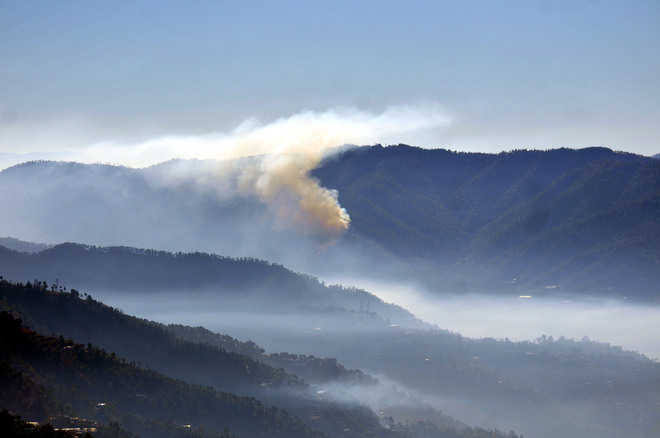A prolonged dry spell and abnormally high temperatures these days have set off alarm bells for the forest department in Himachal Pradesh over forest fires causing huge damage to flora and fauna every year.
Though no major forest fires have been reported so far, smoke from fires has started blanketing the skyline of the state capital these days, as also in the hills around Kasauli, Chail, Dharampur, Bilaspur, Kangra, Hamirpur, Dharamsala and Palampur towns.
“We have identified 23 fire-sensitive forest divisions across the state where a team of at least four Home Guard personnel have been deployed to monitor and control forest fires till June 30, the Principal Chief Conservator of Forests Ajay Sharma told IANS.
He said Home Guard jawans, who are trained by the state Disaster Management Authority and provided with fire-resistance kits, including special uniforms, are part of a dedicated Quick Response Team Task Force, which is formed to extinguish forest fires, in addition to forest staff.
Each team has been provided a vehicle fitted with water tanks and facility to lift pipes which will respond in case of emergency.
Forest department records showed 22 per cent, or 8,267 sq km of the total forest area, particularly in the mid and low hills, is fire-prone.
A majority of the fires were reported from pine forests since, during summer, the trees shed pine needles that are highly inflammable for their rich content of turpentine oil.
The pine forests are found up to an altitude of 5,500 feet. There are 196 forest ranges in the state, of which 80 are most sensitive and fire- prone.
Sharma said a Rapid Forest Fire Force has been registered with the Forest Survey of India through which more than 11,000 volunteers, NGOs and members of Panchayati Raj institutions at the village level will receive satellite-based short message service (SMS) alert of forest fires in their area.
He said the number of SMS registrations on this count are the highest in country and likely to exceed 20,000 soon.
Bilaspur, Una, Hamirpur, Kangra, Sirmaur, Solan, Mandi and Shimla are the worst affected districts in the state.
Bilaspur Deputy Commissioner Vivek Bhatia told IANS that the administration this year has shown tremendous sensitivity to forest fires.
“We have formed panchayat-level patrolling bodies and we will fine persons as well as the panchayats,” he said.
Bhatia has put out a video message appealing to villagers not to set fire to their fields as this has often led to forest fires. These have caused the death of local wildlife and birds.
The video shows widespread forest fires in and around human habitations. The soundtrack has shrieks of the black francolin, a bird of the pheasant family, over the visuals of forest fires raging.
Forest officials say most fire incidents are started by human action. For instance, the local villagers tend to set grasslands afire to get softer grass after the rains. In most cases, the fire from grasslands spreads to nearby forests.
Official figures show 2018 was the worst year with 2,469 fire incidents reported — the highest in eight years — that gobbled up 25,300 hectares of forest across the state.
In 2012-13, the second worst year, pine forest fires consumed 20,773 hectares with a total of 1,798 cases.
Experts say there is technology to handle the pine needles by converting them into combustible bricks.
The state budget for this fiscal has a provision to establish 25 pine needle based units. They will not only help preventing pine forest fires, but will also provide employment opportunities to local people.
According to the India Meteorological Department here, the maximum temperature in some parts of Himachal Pradesh is three to six degrees above average these days.
Shimla recorded the season’s hottest day on Friday with maximum temperature at 30.2 degrees Celsius, five notches above the average.
Himachal Pradesh is the storehouse of biodiversity. Out of total 45,000 species of plants found in the country 3,295 species (7.32 per cent) are present in the state.
More than 95 per cent of flora species are natural to the state and characteristic of Western Himalayan flora, while about five per cent (150 species) are exotic introduced over the last 150 years.
























